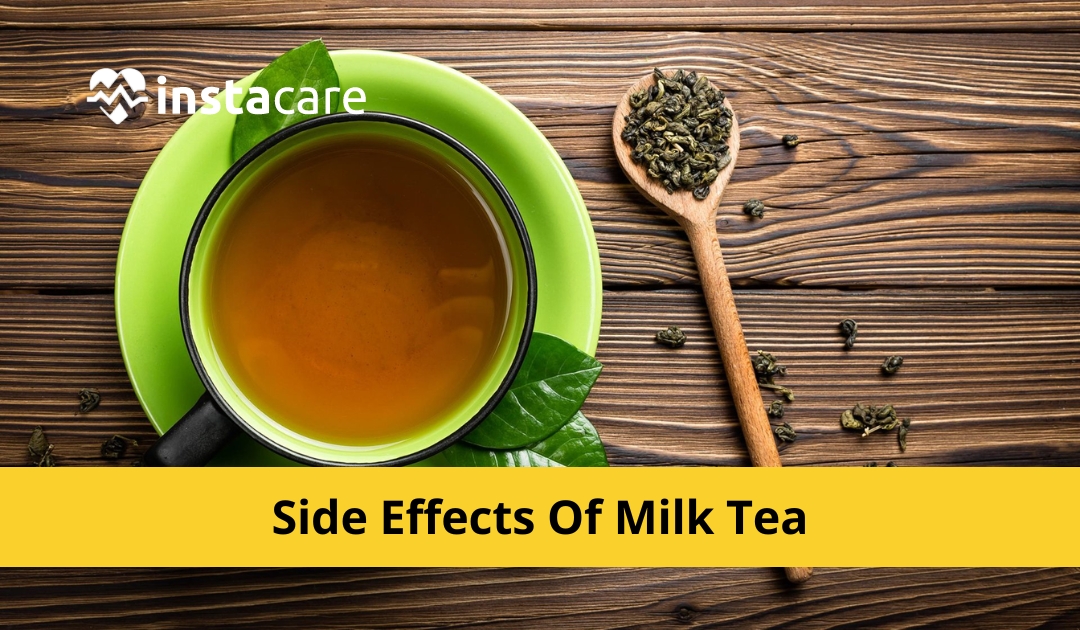Milk tea has been increasingly gaining popularity over the past few years, and for good reasons. Its sweet foam topping and creamy texture make it extremely enjoyable to drink. However, let's not forget about its potential side effects on our health – some of which might be unknown to many people. In this blog post, we'll take a look at the nine side effects of drinking milk tea that everyone should be aware of before partaking. From sugar accumulation in your body to potentially risking your oral health, get all the info you need here!
10 side effects of milk tea on your health
Here are 10 side effects of milk tea on health.
1- Side effects of milk tea on brain
While milk tea can provide a fun and energizing pick-me-up, there are some potential side effects of drinking it on the brain. Caffeine in milk tea has long been known to impact cognitive functioning and lead to lethargy and drowsiness when overconsumed. Studies have also shown that too much dairy can be bad for neural health, leading to memory impairment and difficulty concentrating for those who consume high amounts.
The sugar in milk tea may also cause increased levels of dopamine in the brain, leading to withdrawal symptoms or reliance if drank often. Therefore, moderation is essential when it comes to consuming milk tea, as the side effects from long-term overconsumption can not only be damaging but also difficult to reverse.
2- Side effects of milk tea on stomach
Milk tea is gaining in popularity, with the increasing amounts of bubble tea shops popping up around the world. However, there are potential risks associated with drinking this sweet treat. Side effects of milk tea on stomach include indigestion, nausea, bloating and cramping.
This is because many of these beverages have high levels of artificial sweeteners, fat and caffeine which could lead to disturbed digestion and malfunctioning of your body’s natural processes. Additionally, too much sugar can also cause acid reflux issues. Be sure to monitor your intake and understand that controlling your consumption could prevent unpleasant side effects from occurring.
3- Side effects of milk tea on hair
Milk tea is becoming a popular trend in recent years, but it may be affecting your hair without you even realizing it! Side effects of milk tea on hair can vary from dryness and breakage to damage the scalp. In order to avoid these common issues, it’s important to understand why this type of drink can have such an impact.
Sugar in milk tea has been known to be a leading cause of hair loss as it can clog pores on the scalp and strip away its natural oils. Tannins in tea also dehydrate strands and diminish the quality. To reduce the affects of milk tea on your hair, consider consuming a smaller amount or switching to other drinks with less sugar content.
View More: Is Corn Bad For Gout Everything You Need to Know
4- Side effects of milk tea on skin
Recent years have seen a remarkable surge in milk tea consumption globally. But with any food or drink, health risks should be taken into consideration and that includes the effects of milk tea on skin. Unfortunately, studies show that too much milk tea can have detrimental effects to the health of your skin. Side effects include aggravation of acne and dullness due to its high sugar content which often leads to cystic acne breakouts, aggravated seborrheic dermatitis (or inflammation of the skin), and darker patches under the eyes caused by dehydration, also known as “tea eye bags.”
In addition, caffeine overload from drinking too many cups of milk tea can lead to premature aging of the skin, because is it stimulates a process called "glycation" in which protein molecules from your cells become bound and damaged due to high levels of insulin in the blood stream.
Finally, some leafy ingredients found in certain types of tea like sencha or matcha are known to be high in tannins which can cause irritation for people with sensitive skin if consumed in excess. To reduce these negative side effects on your skin, it is important to incorporate healthy habits such as regular physical exercise and a balanced diet into your routine while being mindful about how much milk tea you consume.
5- Increased anxiety
With the recent popularity of milk tea and its vast availability, it is important to be aware of the possible negative effects associated with it. Milk tea has been linked to increased anxiety in some individuals who consume it regularly due to its high caffeine content. If you’re someone who is prone to feeling anxious, it’s best to opt for herbal or decaffeinated tea instead.
Additionally, consuming any caffeinated beverage late in the day can interfere with quality sleep and make you more prone to bouts of anxiety during the day. Milk tea can be a tasty and enjoyable drink but it is important to remember that, like all things, it should be consumed in moderation and with careful consideration of its potential side effects.
6- Blood pressure imbalances
Having an imbalanced blood pressure can come with a variety of symptoms, ranging from tiredness and headaches to more serious issues such as cardiovascular and kidney problems. Milk tea, while known as a refreshing beverage, has unfortunately been linked to adverse effects on blood pressure control.
Studies have found that milk tea has the potential to increase one's risk for developing high blood pressure, which could lead to further undesirable health issues such as heart attack or stroke. To be safe, it is best to monitor how much milk tea you drink and keep your doctor informed if any changes in your health or lifestyle arise.
7- Reduced iron absorption
Milk tea has become increasingly popular all over the world, but it can have some long-term negative effects on a person’s health, including reduced iron absorption. Milk tea can contain up to five times more levels of flavonoids, which are found in teas, compared to green tea.
Flavonoids inhibit the action of proteins that are important for aiding with the absorption of iron from food sources. Reducing iron absorption can lead to anemia and other health concerns. Therefore, it is important to be aware that overconsumption of milk tea may be damaging your body without you even realizing it!
8- Milk tea can cause insomnia
Milk tea has become quite the talk of the town lately as people now recognize its different flavors and options from around the world. However, many are not aware that drinking too much milk tea could cause insomnia - an unsettling problem for many. Milk tea contains caffeine, which can often lead to difficulty falling asleep.
By consuming more than two cups of milk tea a day, you increase your risk of developing sleeping problems such as prolonged time before falling asleep, shorter sleep duration, morning fatigue and decreased daytime alertness. Therefore, it is important to keep track of your daily consumption of milk tea in order to avoid any potential negative side effects on your sleeping pattern.
9- Milk tea can cause dehydration
Milk tea has become popularly consumed in the last decade, but many don't know that its frequent consumption can lead to dehydration. Milk tea contains a lot of sugar and caffeine, which cause an increase in urinary fluid excretion. This means that while milk tea may quench your thirst temporarily, it doesn’t have enough hydrating properties to properly replenish fluids lost throughout the day.
If you cannot find other drinks to replace milk tea, be sure to drink plenty of water when consuming it and limit how much is being drunk throughout the course of the day. Milk tea has its own unique flavor but recognize that it does come with potential side effects if not managed effectively.
View More: 7 Natural Ways To Boost Your Energy Levels
10- Milk tea can make you addicted
Milk tea has become increasingly popular in recent years due to its unique sweet-salty taste and its easy accessibility. However, what many people don't know is that long-term consumption can have potentially damaging side effects. Milk tea contains high concentrations of caffeine and sugar, which can lead to addiction over time as the body craves more of the substance for satisfaction, making it difficult to stop drinking it. Milk tea also lacks important vitamins, minerals and other necessary amino acids needed for good physical health, making milk tea an unhealthy indulgence on the whole.
Side effects of drinking tea in empty stomach?
Although drinking tea in the morning has become an integral part of many people's lives, there are a number of potential side effects to consider if you consume it on an empty stomach. From digestive issues and inflammation to dehydration and weakened bones, making sure that you have something in your stomach before sipping your cup of tea is essential for your overall health.
High levels of tannins found in teas like green and black varieties can inhibit the absorption of necessary minerals, leading to deficiencies overtime. Therefore, having a snack or a light meal before indulging in your favorite tea brew is strongly advised by medical professionals.
Please book an appointment with the Best General Physician in Lahore, Karachi, Islamabad, and all major cities of Pakistan through InstaCare, or call our helpline at 02137136090 to find a verified doctor for your disease.











